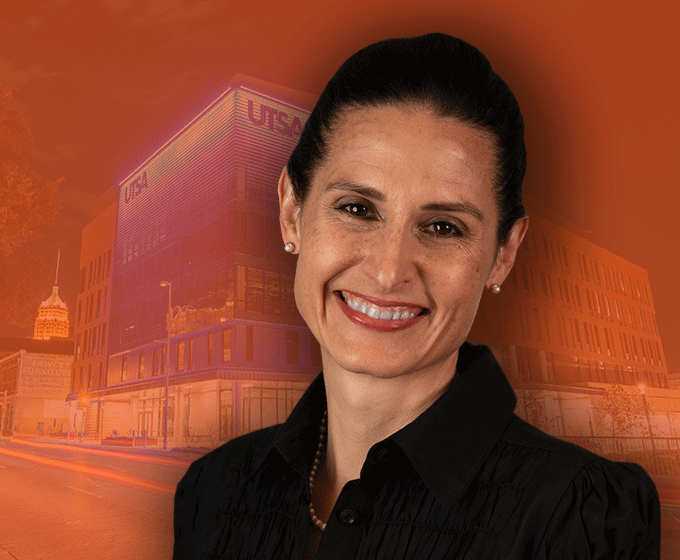Posted on June 5, 2023 by Christopher Reichert

Ginny Garcia-Alexander, an associate professor of sociology in the UTSA College for Health, Community and Policy, has been appointed as a faculty fellow at the university’s School of Data Science. For the next two years, Garcia will lead the next-generation census research initiative, a partnership between UTSA and the U.S. Census Bureau.
 Faculty fellows advance projects aimed at ensuring UTSA’s future as a leading center of data science research and education, while also promoting relationships across the public and private sectors and within the university’s data science community.
Faculty fellows advance projects aimed at ensuring UTSA’s future as a leading center of data science research and education, while also promoting relationships across the public and private sectors and within the university’s data science community.
The partnership between UTSA and the Census Bureau is responding to the national demand for data about people, places and the economy that is more timely, accurate and granular to help address grand challenges that the nation faces.
As the faculty fellow leading the program, Garcia-Alexander will serve as the lead investigator and program coordinator, developing curricular and research agendas for the initiative. She earned her M.S. and Ph.D. in sociology with a concentration in social demography from Texas A&M University. In 2020, Garcia-Alexander joined the UTSA Department of Demography from Portland State University, where she was a faculty member from 2012 until early 2020.
“This is really opening up a world of possibilities in terms of opportunities for the students, faculty, researchers and people in the community,” Garcia-Alexander said.
According to Garcia-Alexander, the Census Bureau has a long history of collaborating with universities all over the country. These partnerships prove incredibly valuable for universities by enabling access to resources and personnel that may ordinarily be unavailable.
“A huge portion of what we are trying to do is create a new generation of data scientists,” Garcia-Alexander said, “so one of the really neat things about this partnership with the Census Bureau is that are we going to have access to their vast array of data products and to their technical experts.”
In the coming months, Garcia-Alexander will be establishing a variety of opportunities for students including research and project-based learning using Census Bureau data, lectures for the university community and workshops with Census Bureau personnel. Participating in these opportunities can give students a competitive advantage as they pursue careers in a variety of data-driven fields—from sociology, to medicine and business.
“There are going to be opportunities for people who have bachelor’s degrees, there are going to be opportunities for people who have a master’s and all the way up the Ph.D. level,” Garcia-Alexander said. “There’s a huge need for people who can engage with data, so through this work we are setting up students to be very marketable.”
Garcia-Alexander also envisions UTSA serving as a bridge between the San Antonio community and Census resources over her fellowship. In the first year, Garcia-Alexander will identify interested parties and begin to establish connections and collaborations, while the second year will be devoted to getting the program and its myriad components operational and engaging students, faculty and community members.
“We hope we will have a really well-established data hub—that UTSA will be seen as a place where you can go to use and be involved with the resources that we have and to make greater use of Census Data products and services,” Garcia-Alexander said.
The School of Data Science, the only one of its kind at a Carnegie R1 Hispanic Serving Institution, was established to lead the nation in data-intensive research and educate top data scientists who can make the world more equitable, informed and secure.
UTSA’s College for Health, Community and Policy is dedicated to developing solutions to affect change for complex social issues to improve the well-being of communities and the world.

